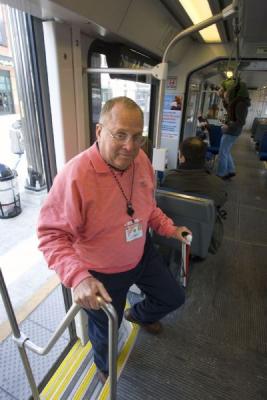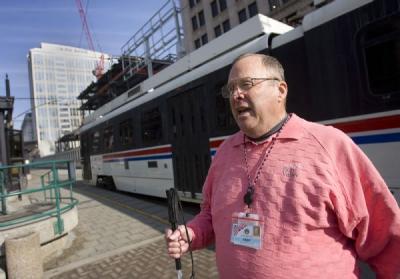Are you a veteran who would like transportation training?
Contact Vietnam Veteran Troy Roper at the V.A. ~~ 801-582-1565, ext 4970. Troy's VA pilot program teaches disabled Veterans how to ride public transportation
 The creator of the training has dedicated his life to helping others after nearly dying.
The creator of the training has dedicated his life to helping others after nearly dying.
By Julia Lyon
The Salt Lake Tribune Updated: 01/20/2010 04:27:10 PM MST
After slipping in and out of a coma for almost six weeks in 2005, Troy Roper woke up at LDS Hospital to learn from his wife that his outlook was grim. While riding his BMW motorcycle at about 70 miles per hour, he had struck a truck making an illegal U-turn west of Wendover, shattering almost every bone in the upper half of his body.
He flatlined multiple times in the helicopter and on the surgical table. Both lungs collapsed. Doctors had to remove his damaged large intestine.
So when the 59-year-old Bountiful man regained consciousness, he made a plea in his prayers.
Roper, who had spent his career in the corrugated box industry, said if he lived he would dedicate his life to helping people with disabilities. He was true to his word, and Utah veterans are about to benefit as a result.
Roper, a Vietnam Veteran, has launched a pilot program at the Department of Veterans Affairs' George E. Wahlen Medical Center in Salt Lake City to teach veterans, particularly the visually and physically disabled, how to ride public transportation.
"I'm trying to establish a lifestyle change," said Roper, who has a traumatic brain injury along with some paralysis and decreased vision. "I know after staying home for 23 months, learning to walk again, depression really sets in."
Though some training already takes place, particularly for people with vision problems, the new Transportation Accessibility Skills program will significantly
expand opportunities for veterans with physical disabilities. Roper will work one-on-one on everything from reading bus schedules to mounting a bus. He asks clients to identify places they want to travel, and he researches routes before practicing with individuals.
 Roper has made all the mistakes himself -- whether it's getting off at the wrong stop or being forgotten by the bus driver. So he plans to teach clients what to do if they get off too early or too late.
The No. 1 question people ask him is where to find a safe public restroom to take a break, so he'll work on that, too.
Roper has made all the mistakes himself -- whether it's getting off at the wrong stop or being forgotten by the bus driver. So he plans to teach clients what to do if they get off too early or too late.
The No. 1 question people ask him is where to find a safe public restroom to take a break, so he'll work on that, too.
Linda Collins is one of the people who received Roper's training when he was doing the program for the public as a volunteer.
The Bountiful resident, who lost much of her vision because of strokes in her optic nerve in 2002, uses his tools "constantly." Like him, she sees public transportation as a key to independence.
"If somebody wants to live and feel like they're living life like everybody else, it's in our favor ... to get out," said Collins, who now works for the Internal Revenue Service one day a week.
Prior to her strokes, she had not even worn glasses. Now she is recalling skills she learned during a college art class that she had hated at the time -- the teacher showed students objects out of focus and encouraged them to identify and draw the items.
"I was able to imagine what a shape or object might be," Collins said.
During the next six months, the V.A. hopes at least a few dozen clients will work with Roper to expand their world. So many people are afraid of public transportation, noted Thomas Wolf, a V.A. orientation and mobility specialist.
"They think maybe there's malicious people on it," he said.
Though safety is a component of Roper's program, Wolf noted that Utah public transportation is far more secure than in some parts of the country. "Here in Utah, it's extremely nice," he said.
More information:
Are you a veteran who would like transportation training?
Contact Troy Roper at the V.A. at 801-582-1565, ext 4970.